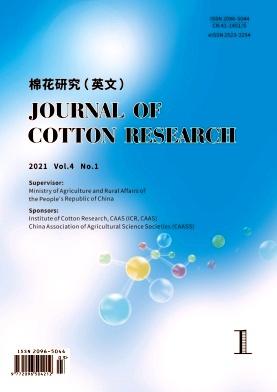Genome-wide identification and analysis of the CNGC gene family in upland cotton under multiple stress conditions
IF 2.4
4区 生物学
Q2 PLANT SCIENCES
引用次数: 0
Abstract
Abstract Background The cyclic nucleotide-gated channel ( CNGC ) gene family plays a significant role in the uptake of both essential and toxic cations, and has a role in enhancing tolerance to various forms of abiotic stresses as well as the modulation of the heavy metal toxicity to plant through the absorption of heavy metals. Results A complete genome-wide identification and functional characterization of the cotton CNGC genes was carried out, in which 55, 28, and 29 CNGC genes were identified in Gossypium hirsutum , G. raimondii , and G. arboreum , respectively. The protein encoded by the CNGC genes exhibited GRAVY value below zero, indicating their hydrophilic property. CNGC genes were unevenly distributed in 19 out of 26 chromosomes, in which the highest density were observed on Ah05, with 8 genes. High gene coverage was observed among the diploid cotton species, with CNGC genes mapped on all A chromosomes and on 11 out of 13 of D chromosomes. The majority of CNGC proteins were localized in the endoplasmic reticulum, nucleus, and plasma membrane. Gene expression analysis revealed the up-regulation of Gh_A01G0520 ( CNGC4 ) and Gh_D13G1974 ( CNGC5 ) across various forms of abiotic stresses. Moreover, down-regulation of Gh_A01G0520 ( CNGC4 ) and Gh_D13G1974 ( CNGC5 ) in CNGC s silenced plants caused the significantly reduced ability to tolerate drought and salt stresses. All CNGCs silenced plants were recorded to have significantly low content of antioxidants but relatively higher content of oxidant, including MDA and H 2 O 2 . Furthermore, SPAD, CMS (cell membrane stability), ELWL (excised leaf water loss), SDW (shoot dry matter weight), and RDW (root dry matter weight) were all lower in CNGCs silenced plants compared with the wild type plants. Conclusion Significant reduction in antioxidant content and negative effects of physiological and morphological characters in CNGCs silenced plants has revealed the novel role of CNGC genes in enhancing cell integrity under abiotic stress conditions. These results provide vital information that will expand our understanding of the CNGC gene family in cotton and other plants, thus promoting the integration of these genes in the development of the environmental resilient plants.不同胁迫条件下陆地棉CNGC基因家族的全基因组鉴定与分析
摘要背景环核苷酸门控通道(CNGC)基因家族在植物必需阳离子和有毒阳离子的吸收中起着重要作用,并在增强植物对各种形式的非生物胁迫的耐受性以及通过对重金属的吸收调节重金属对植物的毒性方面发挥着重要作用。结果对棉花CNGC基因进行了全基因组鉴定和功能鉴定,分别在绵棉(Gossypium hirsutum)、雷蒙地棉(G. raimondii)和木棉(G. arboreum)中鉴定出55个、28个和29个CNGC基因。CNGC基因编码的蛋白肉汁值小于0,表明其亲水性。CNGC基因在26条染色体中的19条分布不均匀,其中Ah05染色体密度最高,共有8个基因。在二倍体棉花品种中,CNGC基因在所有A染色体和13个D染色体中的11个上都有定位。大多数CNGC蛋白定位于内质网、细胞核和质膜。基因表达分析显示Gh_A01G0520 (CNGC4)和Gh_D13G1974 (CNGC5)在各种形式的非生物胁迫下均上调表达。此外,在CNGC沉默植株中,Gh_A01G0520 (CNGC4)和Gh_D13G1974 (CNGC5)的下调导致耐旱和耐盐能力显著降低。所有CNGCs沉默植株的抗氧化剂含量均较低,但MDA和h2o2含量相对较高。此外,与野生型植物相比,CNGCs沉默植物的SPAD、CMS(细胞膜稳定性)、ELWL(切除叶片水分损失)、SDW(茎干物质质量)和RDW(根干物质质量)均较低。结论CNGC基因沉默后植物抗氧化剂含量显著降低,生理形态性状受到负面影响,揭示了CNGC基因在非生物胁迫条件下增强细胞完整性的新作用。这些结果提供了重要的信息,将扩大我们对棉花和其他植物中CNGC基因家族的了解,从而促进这些基因在环境适应性植物发育中的整合。
本文章由计算机程序翻译,如有差异,请以英文原文为准。
求助全文
约1分钟内获得全文
求助全文

 求助内容:
求助内容: 应助结果提醒方式:
应助结果提醒方式:


